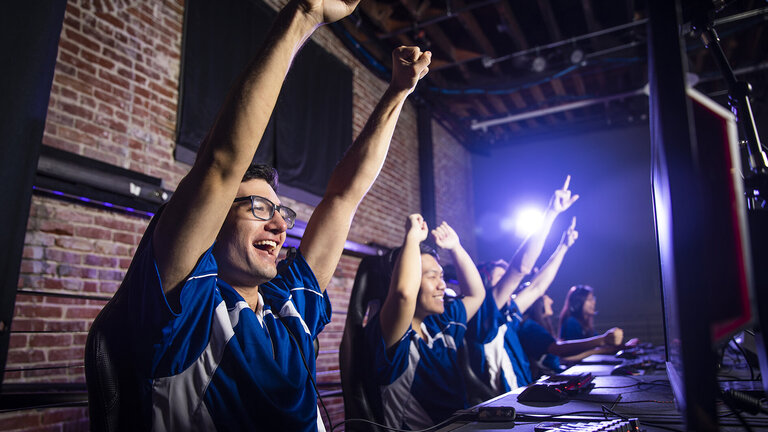In March 2018, the German federal government included in its coalition agreement the objective of recognizing esports as a type of sport. In parallel with this, various sports associations, local authorities and operators of stadiums and arenas are intensively discussing the status of esports in the German sports system at present. The number of esportspersons organized in clubs is increasing overall. Nevertheless, the need for esports user facilities within the grassroots sports sector has not yet been scientifically assessed. For this reason, Drees & Sommer and the ESBD supported Nils Hegger, a student of engineering at the Jade University of Applied Sciences in Oldenburg, Germany, in his bachelor's thesis.
The key result: due to the growing membership of esports clubs, the demand for space will also increase significantly in the near future. In order to find out which spaces are suitable and necessary for esport use as a grassroots sport, the entire spatial infrastructure of an esport clubhouse was represented in the final thesis by means of a room book. For example, it contains information on what space requirements arise for esports clubs and teams in grassroots sports as a function of the number of members and how these requirements are met. This scientific survey not only provides an important basis for the spatial planning of esports clubs, but also defines more precisely the framework for integrating esports into the sports funding and supporting activities of municipalities and German federal states.
‘The future of esports also lies in its regionalization. Our aim is to create social and meeting spaces for esports, bringing people together online and offline. The present results provide the basis required for this type of development. This can be used to produce useful guidelines on action for local authorities,’ said Hans Jagnow, chairperson of the German esports association ESBD. Founded in 2017, the association supports organized esports in Germany, defines key positions and requirements of esports and promotes the further development of this type of sport. In support of the bachelor thesis, ESBD made its expertise and its contacts to clubs, organizers and the political sphere available for the survey.
‘Digital change and the growing importance of esports are challenging the sports sector more and more. A few years ago, the focus was on technology and digital infrastructure, but now the demand for suitable space and buildings is increasing. Demand analyses and defined space requirements form an important basis,’ said Arne Sebastian Fritz, Head of Sports and Enterainment at Drees & Sommer SE. As a business partner, Drees & Sommer's Sports and Entertainment sector team supported its bachelor student in construction and real estate issues and shared its experience from a large number of projects. The consulting and project management company is currently involved in a variety/large number of stadium and arena projects. The most prominent international project is the renovation of the Camp Nou stadium in Barcelona, Spain, for which Drees & Sommer is providing support in relation to sustainability management and certification.
